
Having mentioned the "play face" in my last entry, I thought I would post here some photos showing the concentration and extended upper lip that is part of the expression horses (and mules) demonstrate during game playing. In the top photo we see Altamiro and Jerry earnestly engaged in one of their rough and tumble boy games and Altamiro has extended his upper lip neatly. In the following photo you can see both Altamiro and Jerry's "play face".
 Contrast the look on Altamiro and Jerry's faces in this next sequence of photos. These were taken shortly after Fada was born and Altamiro was being especially protective of the space around Belina and her newborn. Jerry was, like all the rest of the herd, incredibly curious to meet the newcomer, but Altamiro would not yet allow such a meeting. This is no game now, this is a serious conversation!
Contrast the look on Altamiro and Jerry's faces in this next sequence of photos. These were taken shortly after Fada was born and Altamiro was being especially protective of the space around Belina and her newborn. Jerry was, like all the rest of the herd, incredibly curious to meet the newcomer, but Altamiro would not yet allow such a meeting. This is no game now, this is a serious conversation!Altamiro walks over to Jerry, who has been inching closer hoping to get a better look at Fada. Altamiro lowers his head, sets his jaw and walks with measured steps...
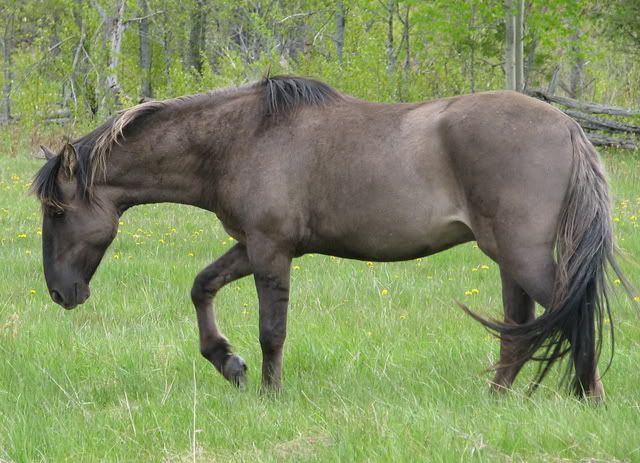 Since this was not the first time Altamiro had warned Jerry about breeching the invisible line separating him from Belina and Fada, Altamiro dispenses with all pleasantries and lunges at Jerry.
Since this was not the first time Altamiro had warned Jerry about breeching the invisible line separating him from Belina and Fada, Altamiro dispenses with all pleasantries and lunges at Jerry.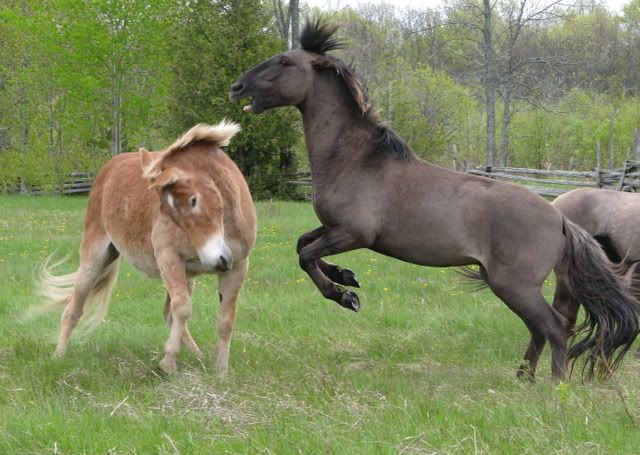 Jerry understands that Altamiro isn't going to yield on the matter, but just to make sure, Altamiro offers a bit more authoritative posturing.
Jerry understands that Altamiro isn't going to yield on the matter, but just to make sure, Altamiro offers a bit more authoritative posturing.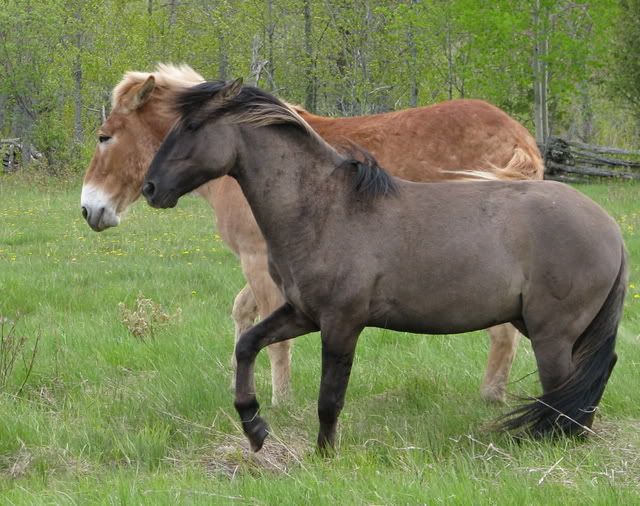 And that's it, conversation is over, Jerry leaves the location and Altamiro goes back to tend to his family.
And that's it, conversation is over, Jerry leaves the location and Altamiro goes back to tend to his family.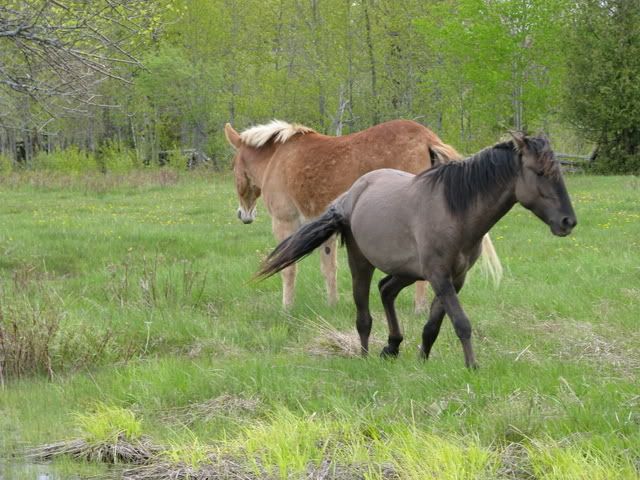
Some of the reader's of this blog have read elsewhere the following account I put together relaying the way our big Thoroughbred gelding, Zeus, played some games with young Animado, even teaching him a new haute école movement. I'm putting this account here in the Journal of Ravenseyrie because it shows, once again, how creatively horses play and also gives a great view of the "play face".
>>>One day this past May, I had been giving Mistral a good currying, and Mistral was enjoying experimenting with different bodily contortions which aided him in receiving the most from my efforts. (These would be terrific to get photos of one day, but it would require assistance, for I cannot curry and take photos simultaneously.)
Animado was most intrigued by the funny posturings the king of the herd was assuming while getting attention from me, so he bounded over..." Whatcha doing? Can I watch, can I watch?"
Of course, soon watching wasn't enough and the adorable colt just had to begin nuzzling and nipping in hopes of getting the attention transferred to himself. Taking a cue from Animado's mother, Bella, I just ignored the little pest and quietly repositioned myself on the other side of Mistral. So Animado began nuzzling and nipping Mistral instead. Mistral gave him a squeal of displeasure and an abrupt thrusting gesture with his head.
Not the least bit deterred, Animado found me on the other side of Mistral and resumed his attempts to distract me. I wove myself around to the opposite side again, which prompted a little game of "Chase Lynne around Mistral".
Zeus soon noticed these activities and dashed over. "Whatcha doing? Can I play too?"
Mistral and I really didn't want to play, we wanted to resume our curry session, so we were grateful when Zeus and Animado dashed off a little ways together and took up the game of "I'm faster at nipping your face than you are at nipping mine!"
While getting back into good a good currying I could yet watch and enjoy how gentle the big "thunder god" was with his little playmate. I could also see a special light in Zeus' expression and I just knew the game of "I'm faster at nipping your face than you are at nipping mine!" was going to morph into a different game.
"Let's play the pesade game!" Zeus seemed to say as he began a demi-piaffe.
"Okay! What's a pesade?" Animado inquired as he scampered around in excitement.
"This is a pesade!", said Zeus as he rose up on his neatly flexed hindquarters.
 "Oh, wow! That's a little like the moves I do when I'm climbing up on mom and dad. I think I can do it! said Animado.
"Oh, wow! That's a little like the moves I do when I'm climbing up on mom and dad. I think I can do it! said Animado.I made hasty apologies to Mistral as I fished my camera out of the bag in hopes of capturing some of this "pesade game".
They played this game for about four or five minutes.
What was especially noteworthy was how pleased Animado seemed to be to discover that he could do this loose version of pesade, and he tried it on his own several times.
 Up until this time, I don't think Animado was quite aware that he could balance on his hind legs without having his front legs dangling on top of his mother or father's body for support. He has played many rearing games with his parents, where he rears up and puts his front legs on them. Typically this was always done from an approach to the front or from the side. Interestingly enough, after watching his dad breed his mother for several days, Animado's rearing game now includes a rear approach, with as much poise and form as Altamiro's stallion activities.
Up until this time, I don't think Animado was quite aware that he could balance on his hind legs without having his front legs dangling on top of his mother or father's body for support. He has played many rearing games with his parents, where he rears up and puts his front legs on them. Typically this was always done from an approach to the front or from the side. Interestingly enough, after watching his dad breed his mother for several days, Animado's rearing game now includes a rear approach, with as much poise and form as Altamiro's stallion activities. But, it took Uncle Zeus to teach Animado that vertical balance could be had without support and that it could become a form of artistic expression. I have no doubt as he matures, Animado will have a picture perfect pesade...his early attempts are a great start.
But, it took Uncle Zeus to teach Animado that vertical balance could be had without support and that it could become a form of artistic expression. I have no doubt as he matures, Animado will have a picture perfect pesade...his early attempts are a great start.In Pluvinel's book LE MANEIGE ROYAL, the translator, Hilda Nelson writes this regarding the Pesade in the glossary section:
"PESADE This movement is the introductory exercise to the 'airs releves'. It is performed in one place. The horse raises his forelegs high off the ground while lowering his hocks. His body is maintained for several seconds at an angle of forty-five degrees. He must keep his hind legs firmly on the ground so that he does not mark time with his haunches. (The 'pesade' became three hundred years later the 'levade', when the body was maintained at an angle of thirty degrees.) If the horse does not lower the hocks, then the horse is merely rearing."
Here is how Pesade is defined in la Gueriniere's book SCHOOL OF HORSEMANSHIP:
"The pesade is an air in which the horse elevates its forehand in place, without advancing, holding the hind legs firmly and in stationary position, so that no cadence is marked by the hind hooves, in contradistinction to all other airs. This exercise is employed to prepare a horse to jump with greater ease, and to accustom it to elevate the forehand."
la Guerienere has quite a bit to say about pesade and how to train (coerce with forceful means) the horse to perform it. He says the pesade is not technically considered an 'air above the ground' because the hind legs stay on the ground, but finds that it is an essential exercise to learn as a prelude to the other airs. He also adds a note of caution, which doesn't seem the least bit necessary for the schooling Zeus is offering Animado.
"Since the most intelligent horses always offer some resistance when they start in the airs above ground, they ought not to be pushed to the limits of their capabilities, for they would become hardened and lose the habit of bending easily; indeed, they might even use the airs above the ground as a form of rebellion by rising up without command. Consequently, caution should be exercised in the initial stages to ensure that the horse falls into none of these vices, which could render it restive."
When training is play, there is no resistance and no vice created. This is clearly something we can see occurring in the natural world of the horses here at Ravenseyrie, and the way Imke Spilker and Alexander Nevzorov have brought play into the schooling manege capitalizes on all the benefits of these classical haute école exercises without the coercion and resistance.<<<
I'll close with two "play face" photos taken in the early spring when Zeus was feeling frisky and had been playing with Jerry.
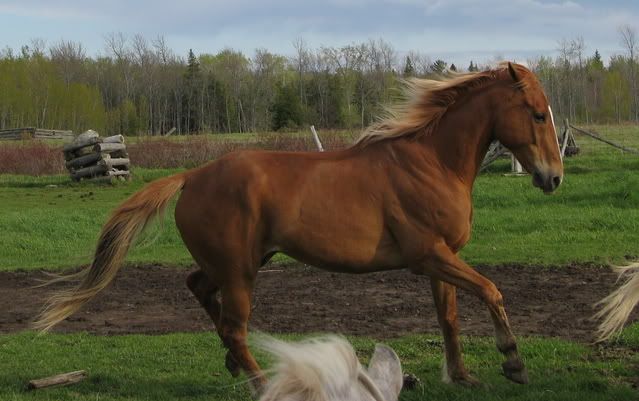
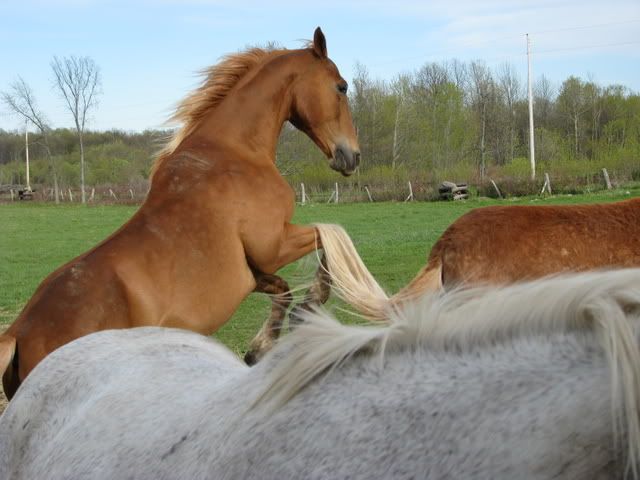 The way horses extend their upper lips when they play is something we also see when they are receiving some exceptionally good itching. There seems to be no mistaking that the horse is focused upon pleasure when the upper lip is demonstrating this expression.
The way horses extend their upper lips when they play is something we also see when they are receiving some exceptionally good itching. There seems to be no mistaking that the horse is focused upon pleasure when the upper lip is demonstrating this expression.
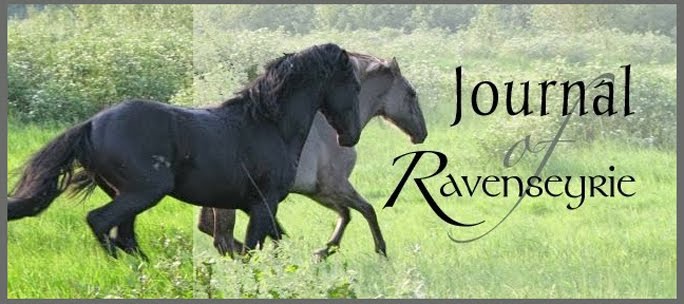
No comments:
Post a Comment